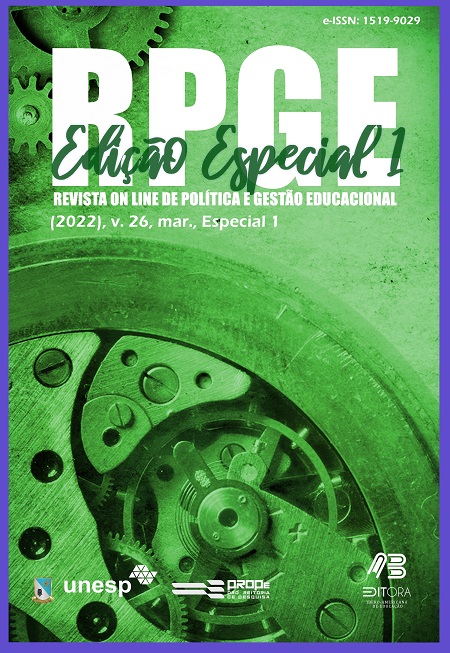Information society
Psychological approach o social networking sites (an educational study)
DOI:
https://doi.org/10.22633/rpge.v26iesp.1.16511Keywords:
Information society, FOMO, Social networking sites (SNSS), Attention-deficit/hyperactivity disorder AD/HD), Mental healthAbstract
The work examines psychological approach to social networking sites (SNSs) and their impact on people. It cannot be categorically asserted that social networks bring only benefit or harm. There are both narrowly focused social networks, which can be useful for work purposes, and multi-user ones, with huge functionality that ensures both the fulfillment of business goals and entertainment. They can help pass time, but they can just as successfully induce addiction in people with excess of that same time. Consequently, the influence of social networks on society is very diverse and ambiguous, and the impact on a particular individual depends on subjective qualities. Since social networks are a relatively recent phenomenon, this potential relationship between their use and feelings of loneliness and depression has not yet been properly investigated. Fear of missing out (FOMO) is another mental health effect that’s been strongly linked with the use of social media.
Downloads
References
ANSARI, J. A. N.; KHAN, N. A. Exploring the role of social media in collaborative learning the new domain of learning Smart Learn. Environ, v. 7, p. 9-17, 2020. DOI: 10.1186/s40561-020-00118-7.
AZIZI, S. M.; SOROUSH, A.; KHATONY, A. The relationship between social networking addiction and academic performance in Iranian students of medical sciences: a cross-sectional study. BMC Psychol., v. 7, n. 1, p. 1-8, 2019.
BEKALU, M. A.; MCCLOUD, R. F.; VISWANATH K. Association of social media use with social well-being, positive mental health, and self-rated health: disentangling routine use from emotional connection to use. Health Educ. Behav., v. 46, suppl. 2, p. 69-80, 2019.
BOUYGUES, H. L. Social Media Is a Public Health Crisis. Let’s Treat It Like One. U.S. News, 2021. Available: https://www.usnews.com/news/health-news/articles/2021-07-20/social-media-is-a-public-health-crisis. Access: 10 Out. 2021.
COPPES, M. J. Teens and Social Media: When is it too much? University of Nevada. Scool of Medicine, 2019. Available: https://med.unr.edu/news/archive/2019/coppes-teens-and-social-media. Access: 10 Jan. 2021.
DANIELS, N. How Does Social Media Affect Your Mental Health? The New York Times, 2021. Available: https://www.nytimes.com/2021/10/01/learning/how-does-social-media-affect-your-mental-health.html. Access: 10 Jan. 2021.
EDMONDS, R. Anxiety, loneliness and fear of missing out: The impact of social media on young people’s mental health. 2021. Available: https://www.centreformentalhealth.org.uk/blogs/anxiety-loneliness-and-fear-missing-out-impact-social-media-young-peoples-mental-health. Access: 10 Jan. 2021.
HOLTERMANN, C. Should There Be Separate Social Media Apps for Children? The New York Times, 2021. Available: https://www.nytimes.com/2021/04/19/learning/should-there-be-separate-social-media-apps-for-children.html. Access: 10 Out. 2021.
KOLHAR, M.; AHMEDKAZI R. N.; ALAMEEN A. Effect of social media use on learning, social interactions, and sleep duration among university students. Saudi Journal of Biological Sciences, v. 28, n. 4, p. 2216-2222, 2021.
MORIN, A. What Your Facebook Use Reveals About Your Personality And Your Self-Esteem. Forbes, 2014. Available: https://www.forbes.com/sites/amymorin/2014/10/31/what-your-facebook-use-reveals-about-your-personality-and-your-self-esteem/?sh=64f04fbc321f. Access: 10 Jan. 2021.
NITTLE, N. How Does Social Media Play a Role in Depression. Very Well Mind, 2021. Available: https://www.verywellmind.com/social-media-and-depression-5085354. Access: 10 Out. 2021.
NORTON, A. Too Much Social Media Time Could Raise Risk of Depression. Web MD, Health Day, 2020. Available: https://www.webmd.com/depression/news/20201214/too-much-social-media-time-could-raise-risk-of-depression. Access: 10 Out. 2021.
POPLAVSKIY, M. M. Azbuka pablik ryleyshnz: navch. posib. dlya stud. vyshch. navch. zakl. [Alphabet of public relations: textbook for students of higher educational establishments] Kyiv: Delta, 117, 2007.
POPLAVSKIY, M. M. Sotsialni merezhi yak kulturno-prosvitnytskyi resurs [Social Networks as a Cultural and Educational Resource]. Ukrainian Information Space, 73, 2020.
RYBINSKA, Y., LOSHENKO, O., KURAPOV, A., PONOCHOVNA-RYSAK, T., & KHOLMAKOVA, Y. The change in the concept of virtue during the COVID-19 pandemic. Amazonia Investiga, v. 10, n. 47, p. 62-69, 2021. Available: 10.34069/AI/2021.47.11.7
RYBINSKA, YU. A. Lingvo-Sociocultural Specific of Talk Show Translation as a TV Discourse Genre. Psycholinguistics, Pereyaslav-Khmelnytsky State Pedagogical University named after Hryhoriy Skovoroda, v. 23, n. 2, p. 192-202, 2018.
RYBINSKA, YU. A. Methodical foundations of the professional communicative preparation of future philologists by means of creative writing. Bulletin of Zhytomyr State University named after Ivan Franko, v. 92, n. 1, p. 5-9, 2018.
SINGKH, A. Positive and negative effect of social media on education. 2020. Available: https://www.theasianschool.net/blog/positive-negative-effect-of-social-media-on-education. Access: 10 Jan. 2021.
Published
How to Cite
Issue
Section
License
Copyright (c) 2022 Revista on line de Política e Gestão Educacional

This work is licensed under a Creative Commons Attribution-NonCommercial-ShareAlike 4.0 International License.
Manuscritos aceitos e publicados são de propriedade da Revista on line de Política e Gestão Educacional. É vedada a submissão integral ou parcial do manuscrito a qualquer outro periódico. A responsabilidade do conteúdo dos artigos é exclusiva dos autores. É vedada a tradução para outro idioma sem a autorização escrita do Editor ouvida a Comissão Editorial Científica.











